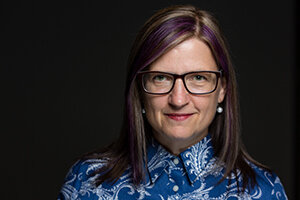“Empty House: Real Estate and Theatricality in Vancouver’s Downtown" wins Katrina Dunn a national PhD dissertation award
The veteran theatre artist has been named co-recipient of the Best PhD Dissertation in Canadian Studies Prize
Katrina Dunn. Photo via University of Manitoba
KATRINA DUNN HAS been named a co-recipient of the Canadian Studies Network/Réseau d’études canadiennes (CSN-RÉC) Best PhD Dissertation in Canadian Studies Prize. The award is given annually to an outstanding interdisciplinary dissertation that enhances and advances the field of Canadian studies.
The director of Vancouver’s Touchstone Theatre for 19 years and a co-founder of the PuSh International Performing Arts Festival, Dunn is currently assistant professor in the department of English, theatre, film and media at the University of Manitoba.
Her thesis for the University of British Columbia, “Empty House: Real Estate and Theatricality in Vancouver’s Downtown”, explores the intersections between theatre studies, cultural policy, and urban real-estate practice.
Here's the abstract of Dunn’s dissertation, from UBC Library:
Vancouver’s spaces of performance are implicated in its real estate drama in ways that are unique to the city. Like characters in a play, these spaces embody and reveal dramatic urban tensions. This thesis looks at the material forces influencing Vancouver’s theatrical culture and uses a historically descriptive lens to understand that culture’s mechanisms of change. The three case studies at its core all hold space in Vancouver’s downtown neighborhood, and each one involves a distinct building, era, and socio-economic context. The first case study is focused on the dual venue of the Queen Elizabeth Theatre and the Vancouver Playhouse, which opened between 1959 and 1963. Run by civic authorities, the complex maintained a dysfunctional relationship with the resident local regional theatre the Vancouver Playhouse Theatre Company, which collapsed in 2012 just shy of its 50th Anniversary. The second study centres on the 1800 seat venue launched in 1995 by Garth Drabinsky’s Livent under the name The Ford Centre for the Performing Arts. Closing after three years due to Livent’s financial scandals, it was purchased in 2001 by Four Brothers Entertainment who established a Pacific Rim identity by programming a blend of European and Asian performance forms. After years of losses, the venue was sold again in 2012 to Westside Church, a local Evangelical Christian organization, and functions now as a church. The third case study is less concerned with a theatre venue’s real estate history than with a real estate development’s link to theatre history. It explores developer Ian Gillespie’s 2013 mobilization of the German modernist art concept of “gesamtkunstwerk,” literally “total work of art,” in relation to his building projects. The apotheosis of this work is Vancouver House, a condominium tower with a design inspired by a stage curtain, which uses theatrical means and metaphors to make sense of its place in the city. Looking at the accumulated impact of the three case studies, the thesis concludes that there is a kind of geopathological malady that infuses spaces of large-scale theatricality in Vancouver’s downtown that contributes to their failure to thrive and to their transformation into hybrid forms.
Dunn has worked extensively across Canada as a director, producer, and dramaturg. She earned her Master's of Arts from UBC and her Bachelor of Fine Arts from Simon Fraser University.













